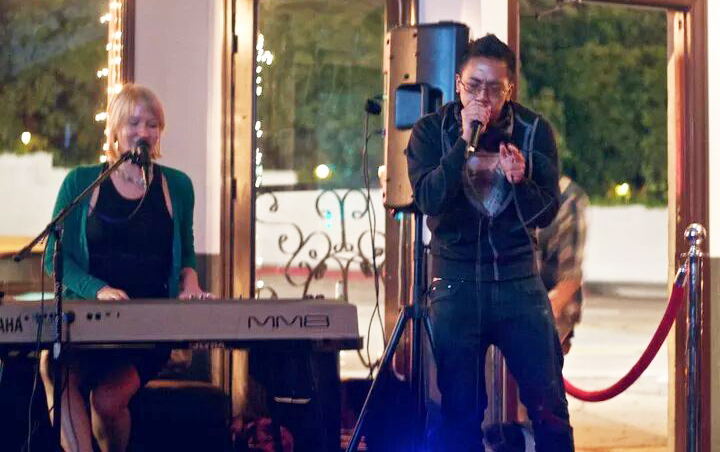Beatboxer to perform at Fowler Museum’s Family Jam

UCLA alumnus and beatboxer Carlo Nick Paredes (right) will perform at Fowler Museum’s “Family Jam: City Sounds’ Beat Boxing” on Sunday.
(Courtesy of Arkae Tuazon)
By Nick LaRosa
Nov. 14, 2014 12:22 a.m.
UCLA alumnus Carlo Nick Paredes’ passion for beatboxing began early, in middle school, after he watched one of his classmates trying to lay down a beat on the playground.
“It was recess, and I remember him trying to show off a little; he thought he was really good,” Paredes said. “I thought I could do better.”
On Sunday, Paredes will be beatboxing as part of the UCLA Fowler Museum’s Family Jam: City Sounds’ Beat Boxing, a collaboration featuring a beatboxing performance and tutorial as well as a modern art installation overlaying the sounds and sights of urban life by artist Pascale Marthine Tayou.
In the 13 years since that first day on the playground, Paredes has hosted and performed solo and as a member of various groups at events such as UCLA’s Spring Sing and various cultural events and was named best beatboxer at last year’s Anahat, the largest live South Asian a cappella festival on the West Coast.
“What I like the most is that all it takes is your mouth,” Paredes said. “I think everyone at one point or another has just started making random sounds with their mouth, and that’s what it’s all about, this spontaneous flow of creativity.”
Beatboxing draws heritage from early American religious songs, blues, ragtime, vaudeville and hokum. Still, Paredes said he believes that the medium shares the same spirit as hip-hop and the urban American community.
“It’s about freedom,” Paredes said. “Hip-hop is defined by this spontaneous flow of individual creativity and beatboxing is the same.”
Paredes said he believes that inherent spontaneity can also be seen in many other iconic hip-hop sounds such as freestyle rap and DJing techniques such as scratching a record.
The pairing of Paredes‘ music and Tayou’s art shares that spirit of spontaneity, as the two have never actually met and will not be in contact before the upcoming event. Yet, while their union was sudden, it was the result of much consideration, said Fowler education manager Corrie Siegel.
With the goal in mind of engaging family audiences who come to the Fowler Museum, Siegal said she set out to find something that shared similar themes and modes of conveyance with Tayou’s art. In one of Tayou’s pieces, “Favela ABC,” Siegel said she recognized observed themes of sound and urbanization as well as Tayou’s ability to create suprising combinations of familiar objects in unfamiliar ways.
“We wanted an art form that uses something so commonplace in a new and artistic way, and that’s what beatboxing is all about,” Siegel said.
According to friends of Paredes, the tutorial portion of the show, his chance to teach, is what he is most excited about.
“(Beatboxing) is his passion; the thing that he dedicates himself to getting better at and perfecting his style at every day,” said Megan Eller, a friend of Paredes. “He’s really excited to be able to share that with people.”
Paredes said while the urban B-Boy and hip-hop scenes, which the exhibit is focused upon, were essential for the formation of his art form, those arenas are just half of the beatboxing community.
During the early 2000s, when Paredes began to beatbox, the majority of the beatboxing scene was rooted in Europe. This posed a problem for the Southern California teen. Paredes said it was for this reason that the online beatboxing scene became instrumental in the development of his talent.
“You could just pop onto a website like Ventrilo and enter a sound chatroom and learn and teach and beatbox with people all around the world,” Paredes said.
The online scene allowed him to begin to learn to beatbox and provided him with a medium to release demo tapes.
“Beatboxing has been so much a part of my life,” Paredes said. “Beats are something that’s always fascinated me, and I’m happy to see that people are interested in what I love.”


